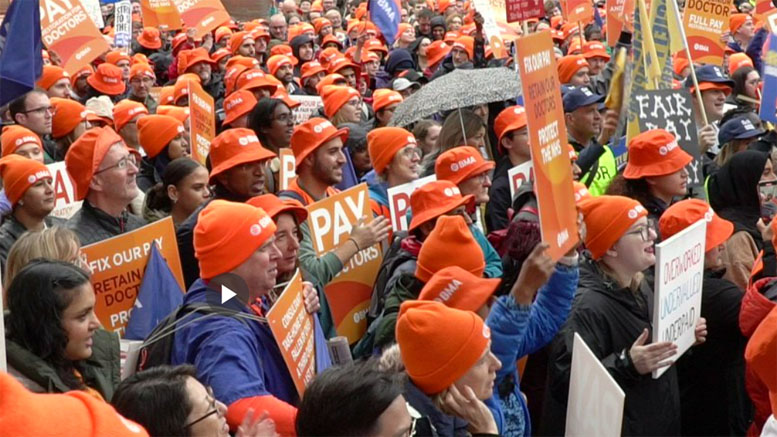Junior doctors working for the NHS in England are to take part in five days of industrial action, beginning at 7.00 am tomorrow (Thursday 27 June). The junior doctors’ strike will end at the same time on Tuesday 2 July, and NHS leaders are warning patients to expect disruption as the industrial action impacts on hospitals, mental health services, GP practices and other NHS services.
“Like previous strikes, we are expecting disruption during this period”, Dr Dave Briggs, the medical director for NHS Nottingham and Nottinghamshire, said. “We are committed to keeping disruption to a minimum and we have measures in place to ensure the safety and welfare of our patients and our staff. However, junior doctors do a vital job, so losing this part of our workforce will inevitably have a knock-on effect and you may find there are longer waits to be seen.
“During the industrial action we will be prioritising patients that need our services the most so if it’s not a life-threatening emergency, an urgent treatment centre can help with the most common problems people go to A&E for, such as suspected broken bones, minor head injuries or burns.
“If you think you need medical help right now but you’re not sure what to do, NHS 111 can help.”
Dr Briggs added: “The NHS is here to help you, but you can help the NHS too. Make sure you have plenty of your prescriptions available in advance of the period of disruption and consider using your local community pharmacy for minor health concerns like insect bites, sore throats and sinusitis. They can also sign post you to the right place to receive care.
“The local NHS is doing everything it can to keep essential urgent and emergency care services running and I would like to thank the public for their continued support.”
The NHS says that the reduction in staff across the system is likely to affect planned surgery and outpatient appointments. But they say patients should attend appointments as planned unless they have been contacted by the service to reschedule the appointment.
“Regardless of any strike action taking place, it is really important that patients who need urgent medical care continue to come forward as normal, especially in emergency and life-threatening cases by calling 999 or going to A&E”, the NHS said. “Where the situation is not life-threatening, alternative support is available through NHS111 online, your nearest pharmacy or at urgent treatment centres.”
Pharmacies can offer over-the-counter advice and treat common conditions including urinary tract infections, middle ear infections, skin infections including impetigo, infected eczema and infected insect bites.
Junior doctors are fully qualified doctors undergoing additional clinical training of up to nine years in a hospital setting or five years in a GP practice, under the supervision of a senior doctor.
The British Medical Association explained the reasons for the latest strike action, saying: “after three months of talks between junior doctors in England and the government, the Prime Minister has still made no credible offer to junior doctors.
“After the general election was called, the BMA gave the government a final opportunity to make an offer and avoid strikes. This opportunity was not taken up.”
The BMA is encouraging junior doctors working across the East Midlands are being encouraged to take part in a regional picket line at the Queen’s Medical Centre in Derby Road, Nottingham from 8 am until 11 am tomorrow (Thursday) before boarding a bus to take them to a nationwide protest outside the Department of Health headquarters in Whitehall, opposite Downing Street.
The health secretary, Victoria Atkins, urged the BMA to call off the strike action, described the planned industrial action as “cynical”. She warned that they “will harm patients”.
She said: “There is Cabinet Office guidance determining what is appropriate government behaviour during the pre-election period. In line with the guidance, it would not be appropriate for the government to make an offer. You know this yet you have refused to call off these strikes”.
In response, the BMA said that “the upcoming strikes are happening because the government, and Victoria Atkins, have never made a credible offer to our members.”
The BMA campaign to restore junior doctors pay to 2008 levels began in March 2023.

